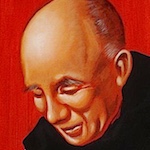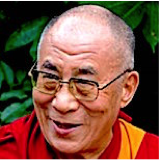

Tao Te Ching

Thomas Merton
1915 – 1968 CE
Mystic, Trappist monk, and friend of Thich Nhat Hanh, Chogyam Trungpa, the Dalai Lama, and D.T. Suzuki; Merton championed social justice issues, the civil rights movement, and ending the nuclear arms race. Writing more than 70 books, he continually studied and practiced not only Christian mysticism but also Buddhism, Taoism, Hinduism, Jainism, Sufism, and Native American spirituality. In 2015 Pope Francis called him, “a thinker who challenged the certitudes of his time and opened new horizons… a man of dialogue, a promoter of peace between peoples and religions.”
Lineages
Christian Translators
Eras
Sources
Unlisted Sources
Quotes by Thomas Merton (18 quotes)
“Chuang Tzu agrees with the paradox of Lao Tzu, ‘When all the world recognizes good as good, it becomes evil’ because it becomes something that one does not have and which one must constantly be pursuing until, in effect, it becomes unattainable.”
Chapters:
2. The Wordless Teachings
Comments: Click to comment
“Chuang Tzu drily observed that the pursuit of the ethical Tao became illusory if one sought for others what was good for oneself without really knowing what was good for oneself.”
Chapters:
26. The Still Rule the Restless
Comments: Click to comment
“Chuang Tzu is mysterious because it is so simple that it can get along without being a way at all… Chuang Tzu would have agreed with St. John of the Cross, that you enter upon this kind of way when you leave all ways and, in some sense, get lost.”
Chapters:
34. An Unmoored Boat
Comments: Click to comment
“Chuang Tzu is not concerned with words and formulas about reality, but with the direct existential grasp of reality in itself. Such a grasp is necessarily obscure and does not lend itself to abstract analysis.”
Chapters:
48. Unlearning
Comments: Click to comment
“Confucius may have had access to the manifest aspects of the Tao ‘that can be named,’ but the basis of all Chuang Tzu’s critique of Ju philosophy is that it never comes near to the Tao ‘that can not be named,’ and indeed takes no account of it.”
Chapters:
56. One with the Dust
Comments: Click to comment
“In an age where there is so much talk about ‘being yourself,’ I reserve the right to forget about being myself, since in any case there is very little chance of my being anybody else.”
Chapters:
79. No Demands
Comments: Click to comment
“My opinion is that you never find happiness until you stop looking for it. My greatest happiness consists precisely in doing nothing whatever that is calculated to obtain happiness”
Chapters:
20. Unconventional Mind
Comments: Click to comment
“There is no question that the kind of thought and culture represented by Chuang Tzu was what transformed highly speculative Indian Buddhism into the humorous, iconoclastic, and totally practical kind of Buddhism what was to flourish in China and in Japan in the various schools of Zen.”
Chapters:
41. Distilled Life
Comments: Click to comment
“We are so obsessed with doing that we have no time and no imagination left for being. As a result, men are valued not for what they are but for what they do or what they have - for their usefulness.”
Chapters:
7. Lose Yourself, Gain Your Soul
Comments: Click to comment
“In a world of tension and breakdown, it is necessary for there to be those who seek to integrate their inner lives not by avoiding anguish and running away from problems, but by facing them in their naked reality and in their ordinariness.”
Comments: Click to comment
“We live on the brink of disaster because we do not know how to let life alone. We do not respect the living and fruitful contradictions and paradoxes of which true life is full.”
Comments: Click to comment
“The book of the Bible that most obviously resembles the Taoist classics is Ecclesiastes.”
Comments: Click to comment
“I like Chuang Tzu because he is what he is, not concerned with words and formulas about reality, but with the direct existential grasp of reality in itself. Immediately going to the heart of things, his philosophy is profoundly original and sane. I think i may be pardoned for consorting with this Chinese recluse who shares the climate and peace of my own kind of solitude, who is my own kind of person.”
Comments: Click to comment
“There is a monastic outlook common to all who question the value of a life submitted entirely to arbitrary, secular presupposition dictated by social convention and dedication to the pursuit of temporal, mirage-like satisfactions; and instead, find something they vastly prefer in solitude.”
Comments: Click to comment
“In this world that our technological skill has made rigid, artificial, and spiritually void; we have a desperate need to recover spontaneity and depth.”
Comments: Click to comment
“It is when we insist most firmly on everyone else being 'reasonable' that we become ourselves, unreasonable.”
Comments: Click to comment
“As long as you have to defend an imaginary self that you think is important, you will lose your peace of heart... there is no joy in things that do not exist.”
Comments: Click to comment
“Meditation is one of the ways in which the spiritual man keeps himself awake.”
Comments: Click to comment
Quotes about Thomas Merton (1 quotes)

“Thomas Merton really is someone that we can look up to.... he had the complete qualities of hearing—study, contemplating, thinking on the teachings—and of meditation. He also had the qualities of being learned, disciplined and having a good heart... for the rest of my life, the impact of meeting him will remain until my last breath.”
Comments: Click to comment
Comments (0)